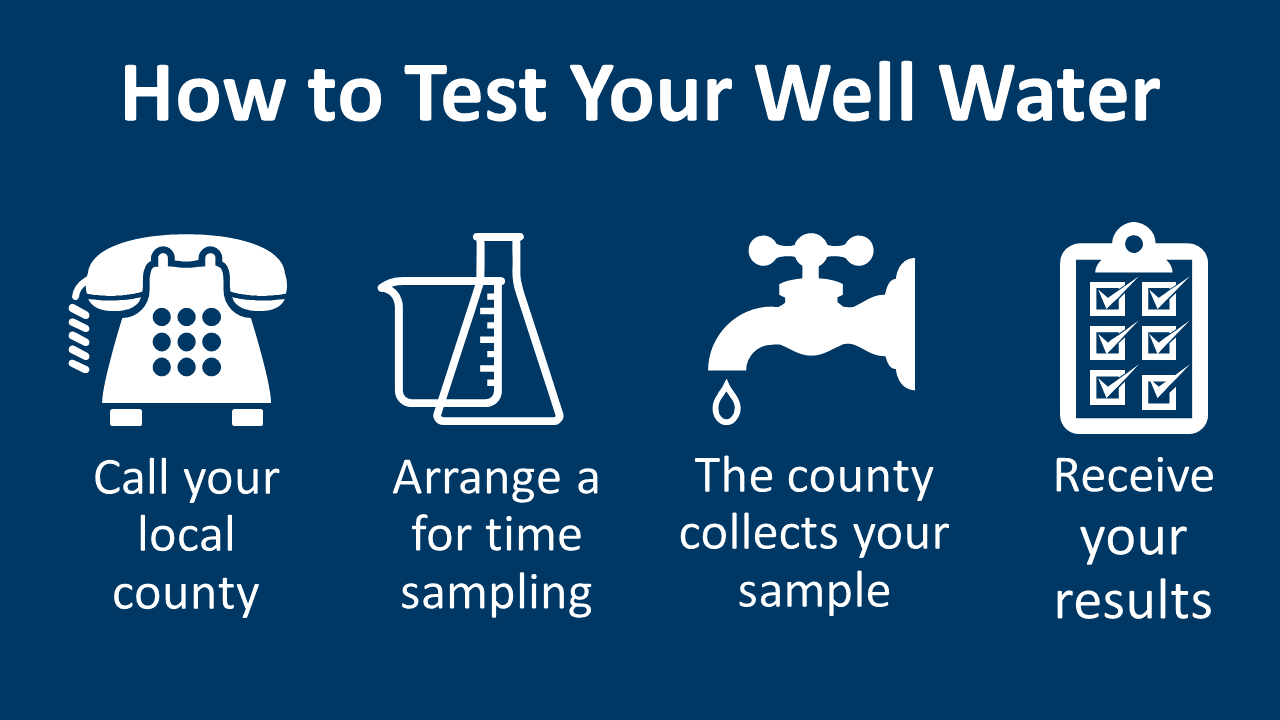Private Well Water Testing
Private Well Testing Information
Iowa's Private Well Grants Program (PWG) provides free water testing to all private well owners and users for the analytes listed below. The Iowa DNR recommends that all private well owners have their water tested at least annually. To get your private well tested, please contact your local county health department. Click here to fill out an application for a well test. https://permitting.schneidergis.com
County Health Department - contact list (click here)
- Bacteria/coliform (annually)
- E.coli/fecal coliform (annually)
- Nitrate (annually)
- Arsenic (every 3 years)
- Manganese (every 3 years)
- PFAS (requires pre-approval from the DNR)
Private Well Services - Grant money available
In addition to private well testing, the PWG program offers funding for the private well related services listed below.
- $400 - Shock Chlorination (Form 542-0503)
- $600 - Well Assessment (Form 542-0502)
- $700 - Well Plugging (Form 542-1226)
- $400 - Cistern Plugging (Form 542-1226)
- $2,000 - Well Reconstruction or Renovation (Form 542-1519)
Please follow these steps:
- Contact your county health department (click here) and notify them that you are wanting one of the above services.
- Contact a DNR certified well contractor to perform the work. The bullets below tell what type of work each type of contractor can perform, and links to a list of those contractors sorted by their city of residence.
- Well Drillers (click here) - (Shock chlorination, well assessments, reconstruction, well plugging (except pump and plumbing work))
- Pump Installers (click here) - (shock chlorination, well assessments, reconstruction (upper 10 feet only), well plugging)
- Well Pluggers (click here) - (can only plug Class 1 and Class 3 wells - all other well plugging must be performed by a well driller or pump installer)
- Non-certified contractors or non-certified people are not legally allowed to perform well services in Iowa, so always double check with the person you hire to ensure they are certified by and on the lists linked above.
- Tell the contractor you are seeking Private Well Grants funds and will require the following documents following completion of work:
- Fully completed DNR form based on the type of work
- $400 - Shock Chlorination (Form 542-0503)
- $600 - Well Assessment (Form 542-0502)
- $700 - Well Plugging (Form 542-1226)
- $400 - Cistern Plugging (Form 542-1226)
- $2,000 - Well Reconstruction or Renovation (Form 542-1519)
- Itemized "paid" invoice
- Fully completed DNR form based on the type of work
- Submit these items to the county health department (click here)
- The county will reimburse you directly once your required forms and invoice have been reviewed and approved.
More Information
If you are seeking testing for analytes that are not listed above, please contact your county health department to discuss your situation. If the county thinks additional testing is needed, the county may be able to contact the State Hygienic Laboratory to seek approval for further testing of more complex contaminants, or provide additional guidance to improve your water quality. Please see the State Hygienic Laboratory GTC website to learn more.
Private Well Grants - Guidance Document for Qualifying Services - this document provides detailed information regarding what types of wells and specific services qualify for PWG funding.
The PWG program is a collaborative program with administration through the Iowa Department of Health and Human Services (HHS), and technical assistance provided by the Iowa DNR's Private Well Program. To learn more about the PWG Program, please visit this HHS web page: Private Well Grants (PWG).
A summary of the private well testing process for private well owners is shown in the diagram below.

Here are some facts that private well users should know.
- You are responsible for your own water testing.
Local county environmental health departments can assist, but you need to contact them to initiate water testing. Find out more about water testing. Contact your local county environmental health department. - Lab analysis is the only way to know if your water supply is safe. You cannot tell if your water is safe by look, taste, or smell. Find our more from the CDC.
- Contaminated groundwater can cause illness.
This holds true with everyone - especially young children, the elderly, and those with compromised immunity. Find out more about what may be in unsafe water. - Every private well used for consumption should have the well water tested at least once each year. In addition, test your well water when the well is brand new, anytime you have your well, well pump or water system serviced, or when you notice a change in the way the water looks, smells, or tastes. Find out more about water testing.
- Some aquifers cannot provide safe drinking water. Although many of Iowa aquifers can provide safe water when proper well construction is used, some shallow aquifers and shallow karst bedrock regions have high levels of nitrate, bacteria problems, and potentially other contamination from land based sources. Find out more about karst bedrock water sources.
- Unused, non-plugged, or improperly plugged wells can cause issues with your current well. Old wells may not be located or constructed properly. This means they may allow surface water and very shallow groundwater a direct connection to the aquifer serving your current well. This can create water quality issues in your current water supply regardless of the well's age and construction. Find our more about well plugging and why it is important.
- Water treatment may be an option depending on the type of contaminant(s) present, the level of the contaminant(s), and the amount of water needed each day. Find out more about water treatment options. Or visit our water treatment web page.
- All wells need periodic inspection AND preventive maintenance. Find out more about inspecting your well. Find out more about maintaining your well.
- When hiring a contractor for any well services, make sure they are properly certified by the Iowa DNR. State law requires all well contractors to be certified by the Iowa DNR. The certified individual must be on-site while all well services are being performed. Find out more about DNR Well Contractor Certification. Check to see if your well contractor is Iowa DNR Certified.
- You should always have a contract when hiring anyone for well services. Contracts help protect all parties. Find out more about hiring a well contractor.
- Well construction permits are required for all new water well and geothermal loop installations as well as when certain types of well reconstruction is planned. Find out more about well construction permits.
View fact sheets and additional well resources.
View Wellowner.org - An industry leading source of information on water wells.
View "Is your well water safe?" - a publication from The Private Well Class.
View the Centers For Disease Control and Prevention (CDC) Private Well Resources


